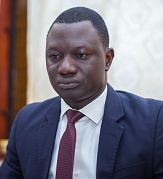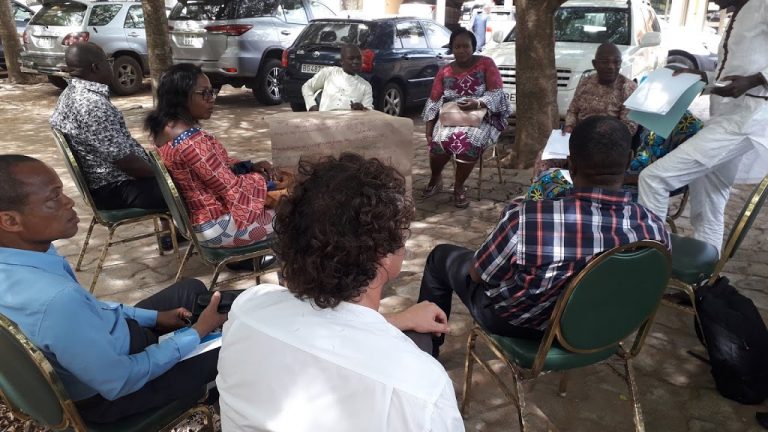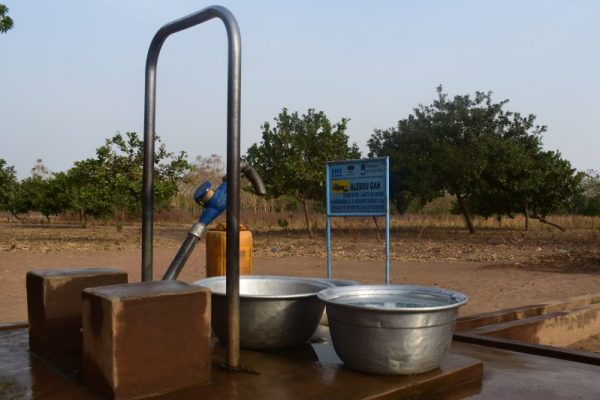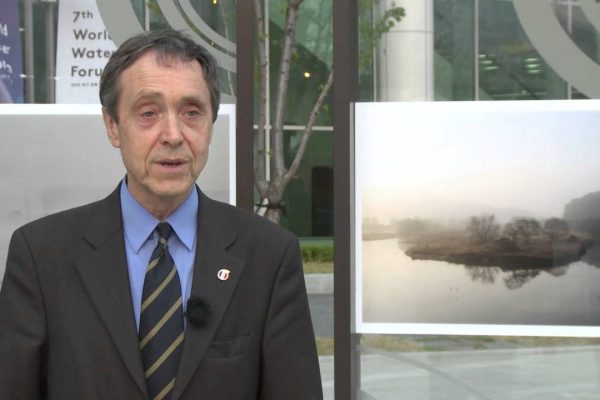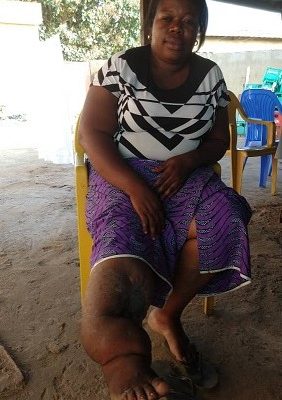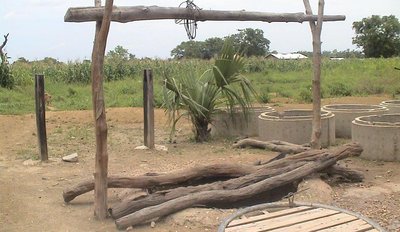by Alain TOSSOUNON (Benin)
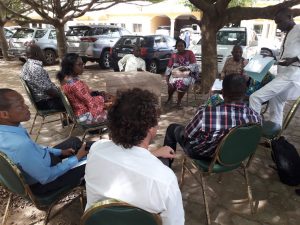 |
| Vue partielle des participants au cours des travaux en groupe |
On May 28 and 29, 2019, SNV, the Netherlands Development Organisation, which manages the Non State Actors Fund (NSA) of the OmiDelta Programme organized an exchange workshop for the Implementing Organisations (IOs) of the Water Supply, Hygiene and Sanitation (WASH) component projects financed by the Fund. This workshop aimed to promote the sharing of experiences and knowledge as well as mutual learning between NSA Fund actors. Thus, it was an opportunity for participants, composed mainly of representatives of the IOs (AERAMR, Oxfam, SIA N’SON, Helvetas, Protos, ANAP, AProDESE), to discuss results and lessons, as well as on good practices resulting from the implementation of their different projects. In addition to the IOs, the representatives of the key actors in the sector were present, including the General Directorate of Water (DGEau), the National Agency for the Drinking Water Supply in Rural Areas (ANAEP-MR), the National Association of Municipalities of Benin (ANCB), OmiDelta Technical Assistant and GIZ.
With the aim of strengthening the exchange of experiences and knowledge among the implementing organisations on the main progress, and to propose practical arrangement to improve the performance of the projects, the meeting was also an opportunity to capitalize the results and best practices. Faced with the representatives of the various organisations involved and recipients, the Coordinator of the NSA Fund indicated that now time is up to results sounding the mobilization of all. Therefore, he invited each IO to a critical analysis of the progress of its project in order to highlight progress made, difficulties and challenges to be met. It is therefore in this friendly vibe and an atmosphere of mutual learning that the workshop took off with three key highlights: sharing results obtained by each organisation with the challenges identified (or to be raised) and encountered difficulties; research and identification of best practices that are staining; actions to be undertaken to improve project performance.
The presentation of the progress made was one of the highlights of the meeting. It allowed different organisations to present their salient results recorded. In terms of intermediate progress, we mainly note in terms of water supply the construction and rehabilitation of structures, the installation of water meters on boreholes equipped with human motricity pump (FPM) and the rehabilitation of water kiosks in the peripheral zone especially in Parakou municipality by AProDESE ONG. We also note as progress, the reinforcement of the capacities of the municipal actors (elected representatives, managers and agents) to guarantee the good management and the sustainability of the works, the promotion of accountability and the citizen watch through the support to the Association of the Drinking Water Consumers (ACEP) in many localities. In terms of hygiene and basic sanitation, the results are equally edifying with the evolution of the number of localities maintaining their Open Defecation Free (ODF) status with the interventions of AERAMR in the sanitary zone of Djidja, Abomey, Agbangnizoun. The situation is similar in the municipalities of Karimama, Malanville and Kandi with SIA N’SON’s actions for consolidating the achievements of Community Led Total Sanitation (CLTS). In terms of results, we can also highlight the training of masons for the construction of latrines and in particular pit latrines, as well as the launch of the process of building a sewage sludge treatment plant with Oxfam in its area of intervention (Ouidah, Kpomassè and Tori-Bossito). Meanwhile, the InnEAUVASSion project carried out by Protos is focusing on Sanimarketing in 5 municipalities of the departments of Collines, Mono and Couffo (Lokossa, Athiémé, Dogbo, Dassa-Zoumé and Savalou).
Beyond a simple review of progress, the exchange workshop has mainly enabled the implementing organisations, to confide their challenges and sometimes common fears in order to reflect together on how to deal with them. The challenges are mainly : respect of contractual deadlines, commitment of municipal actors to follow up, sustainability of technologies promoted and mechanisms put in place, evaluate the number of people affected by Behavior Change Communication (BCC), risks associated with the « Tontines latrines » device to encourage communities to equip themselves with latrines, maintenance of the ODF status, the difficulties linked to the ongoing reforms in the sector and which influence the proper execution of interventions at local level, etc. From discussions and lively exchanges to better understand the contours of the approaches and strategies used by each organisation, it is essential to retain that, overall, the actors are concerned by the sustainability of the devices and mechanisms put in place. Thus, in terms of the involvement of municipal stakeholders in the appropriation of their roles and responsibilities, if the signing of the protocols with each municipality constitutes a strategy for the engagement of the elected representatives, it is necessary to go further to ensure the sustainable management of the structures and the continuity of the public water service. In addition to accountability and citizen watch by the ACEP, it is important to boost managerial staff concertation and consultation frameworks at the municipal level to better monitor and control the commitments of each actor and therefore sustainability.
Otherwise, in order to better monitor the progress and the achievement of the objectives set, the participants attended an overall presentation of the baseline study results based on the data collected in the intervention areas of the 7 WASH projects. Various tools were used, such as different questionnaires and interview guides according to the nature of the project, in order to insure data reliability and facilitate data collection through the Akvo Flow application. The 2018 projects’ results are all aggregated and available on the International Aid Transparency Initiative (IATI) platform. For the future, it is expected from each organisation, a better definition of indicators and a particular attention to the good quality and reliability of data collected, as well as evidence on the reported results.
The sharing of best practices was the second highlight of the workshop, during which the different organisations were divided into two groups, namely those which are active in the drinking water supply subsectorn (Helvetas, ANAP, Protos, AProDESE) and those whose fields of action are hygiene and basic sanitation (Oxfam, AERAMR, SIA N’SON) to identify and share their best practices. This exercise on school experiences proved to be exciting for participants who shared several best practices. For example, for water services we can report the installation of meters on boreholes equipped with human motricity pump (FPM) of AProDESE allowing to follow the management of the delegates and beyond, the royalties but also the quantity of water consumed by the people. In addition, this innovative practice could provide sustainable jobs for young people and women in charge of monitoring and managing the water points.
In concerning the hygiene and sanitation, the case of the « latrine tontines » caught the participants’ attention as it allows the pooling of resources by households and promotes the scaling up in ODF villages. The experience of Helvetas in terms of transparency and accountability to improve the fee collection at the level of water structures, and the traceability of the revenue from the sale of water was also interesting. At the end of this exercise, which turned out to be interested not only for the implementing organisations, but also for SNV and the sector as a whole, the participants were invited to continue the search for best practices and more particularly to document them.
On the sidelines of the presentation of these experiences, several communications have helped to nurture knowledge, particularly in terms of youth employment promotion in the WASH sector with Plan Benin, the involvement of women with GIZ through the ProSEHA Programme, sustainability with Oxfam and the OmiDelta Technical Assistant. The communication on the sustainability of investments, showed the importance of the measures to be implemented to guarantee the continuity of the service beyond the project life. To this end, the experience of supporting the municipalities in terms of staff to strengthen the work of the Responsibles for water, hygiene and sanitation (REHA) at the level of the State Actors (AE) Fund has been shared. Moreover, best practices and experiences sharing from Mali has helped highlight the importance of putting sustainability at the center of IO projects. « This is a responsibility of all, institutions and communities, » concluded the NSA Fund Coordinator, calling on all to document any measures or actions undertaken to ensure sustainability.
A roadmap and recommendations to perform
Participants looked to the future during the third and final highlight of the workshop. Starting from the observation on the delay in the implementation of the projects, each organisation drew up a roadmap to improve the performance of the implementation of its activities taking into account the achievements of the workshop. The aim is not to take over the annual work plan (PTA) (without excluding modifications where necessary), but on the one hand to identify the factors of success and especially the bottlenecks to the good execution of the PTA, and on the other hand to identify actions to be taken to improve the implementation of interventions. The participants also recommended the need for a synergy of action between the organisations for boosting the ACEPs, and maintaining the ODF status.
At the end of the workshop, the participants did not hide their satisfaction for the quality of the exchanges. « We really learned. The exchanges were very rewarding and will definitely boost the implementation of our projects or even the initiation of new projects” according to Emmanuel ADJERAN from ANAP when representing NGOs that implement small projects. As large projects are concerned, it was Edouard AKPINFA from Oxfam who took the floor to emphasize that sharing experiences could reveal a new positive face of projects. « We are leaving with another energy for the implementation of our projects. We are refreshed and remotivated, » he said. The ANCB representative, Euménique ALLADATIN, who was also delighted to have participated in this meeting reassured the recipient organisations about the availability of local authorities which all have at heart the promotion of water and sanitation sector. For the representative of the Agency for the Drinking Water Supply in Rural Areas, Joseph OKE, « The SNV team did well to have not waited until the end of the project to capitalize ».
Welcoming the smooth running of the workshop while thanking the participants for their participation and contribution, the Coordinator of the NSA Fund reiterated the availability of SNV to « continue to provide the necessary support to the implementing organisations for the effective and efficient implementation of their projects ».
The workshop ended on a note of satisfaction with the commitment made by the implementing organisations to work on performance improvement in the implementation of projects’ activities, and on sustainability, because both are major concerns for the sector as well as a contractual obligation.
The cap is now set for peer-to-peer exchange visits and an appointment is made for an annual learning session based on the experience of IOs to reinforce the knowledge acquisition process.
Some recommendations of the workshop
● Strengthen synergies and complementarities between implementing organisations as well as with other ongoing programmes / projects or initiatives;
● Pursue reflections and sharing of ideas and experiences on sustainability of achievements and document them;
● Use the National Association of Municipalities of Benin (ANCB) in case of difficulties within municipalities;
● Improve integration of cross-cutting themes (Governance / Gender / Innovations / Youth Employment / Climate Change ) in the interventions;
● Improve project performance;
● Effective and efficient use of monitoring tools and mechanisms to support the collection of reliable data;
● Take steps to better informing the recipient organisations about the content of ongoing reforms in the sector and especially of AN AEP-MR’s interventions;
● Increase the visibility of the OmiDelta programme in the field.
